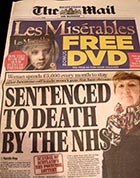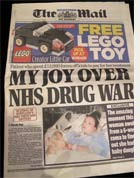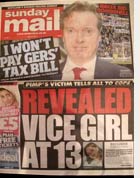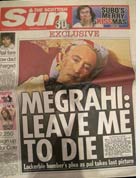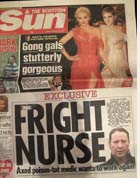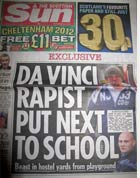Not surprising that after Lord Leveson’s report yesterday, there was considerable support for legislation to regulate the press. I can understand why some people think it’s necessary, but much of the public’s disquiet is based on misconceptions and on celebrity tales of woe that were accepted largely without any great degree of testing by Lord Leveson, but maybe could have done with a bit more detail.
It was already established beyond doubt, but Lord Leveson underlined it, that the single most shocking act under examination, the deletion of Milly Dowler’s phone messages, was not carried out by the News of the World. Charlotte Church was fairly eloquent on Question Time last night, and infinitely preferable as a celebrity victim of media excess to self-serving, self-important pricks like Hugh Grant and Steve Coogan. But we could have done with an explanation of how her mum was ‘blackmailed’ into telling all about her depression and self-harm.
Other stories that were told to the inquiry could have done with a bit more detail and the production of some evidence to back them up. I’d love to know the identity of the journalist who thought the way to secure an interview with JK Rowling was to put a note in her daughter’s schoolbag. Presumably, that person was too stupid to ever work again, but I’d like to know for sure that the perpetrator was a journalist and not just a prankster. Was the matter reported? Did the author of the note get a police warning, or were they served with an interdict to stay away?
But to the point: in the last two years here are just a handful of the very good stories I’ve picked up through my contacts that I was unable to get into print due to the protection afforded to the rich and famous by injunctions, or super-injunctions, and due to the caution of an industry that has been bitten on the bum quite hard and quite often in recent years and seems to me to be regulating itself pretty well.
A contact of mine filmed video footage of a member of the Royal family on a train, drinking with friends, laughing and talking loudly. No problem with any of that. Their loud voices and the equipment they were carrying made it clear to fellow passengers, including my contact, that they were going on a shooting trip. During the journey, at a stop, two of the party got off the train, leaving their equipment, including rifles, secured in cases on the overhead rail. They didn’t make it back on before the train left. Royal security officers leapt into action, local police were contacted, and the two drunken members of the party were rounded up by police and taken to meet the train at its destination. Two Sunday tabloids wanted the story and were bidding big numbers for it, when the Palace lawyers contacted the news-desks to say that any article on the matter would breach privacy and would be a stick-on PCC complaint that they expected would be upheld. The story was dropped immediately.
About two years ago, I was working on two stories simultaneously involving the private lives of prominent sportsmen. One, who was then a star with a Premier League club, had fathered a child with his lover, a young woman who lived on a council estate in a very unfashionable town. He would arrive at her flat in his £100,000+ car, so he was hardly the soul of discretion. Another, famous for his prowess in an individual sport played with a small ball, had had an extra-marital affair with a beautiful air hostess, who was also married, and had paid her and her husband hush money when the affair emerged. If they ever talked about it, they had to repay twice the six-figure sum they had received. Two threats of super-injunctions resulted in another two dropped stories.
More recently, and much more important in terms of public interest, I had a tip from a contact about one of the country’s richest men, a tax exile (and how I hate them) who had made his fortune in this country, continues to make his money in this country, but lives abroad to avoid paying his rightful dues in tax. He’s allowed to spend 30 days a year in the UK under the agreement he has with HMRC. Home alone for a short spell on business, he had an accident at home that left him with a life-threatening injury. He required surgery and spent a long time in intensive care. The NHS, funded by those of us who do pay our taxes, had saved his life. Within five minutes of contacting his business seeking a comment, the reporter who I’d passed the story to, via his news-desk, received a threatening call from the rich man’s lackey, I mean lawyer, citing privacy, insisting that the story involved his client’s health so couldn’t be reported, and threatening to sue. I thought there was a clear public interest element because he was a tax exile. I also wanted to make damned sure the Revenue knew about his extended stay. But there was no appetite for a fight.
Sometimes, the press can be an ass. When I started 23 years ago, it was expected that we would occasionally challenge authority. Now, there is a climate of fear far greater than anything I’ve known before, and too often this leads to important stories being ignored, while our tabloids are filled with celebrity pap. A few months ago, I secured an interview with the taxi-operators who were supposedly extorted by Russell Stirton and Alex Anderson, men who the police and others had been telling us for years were gangsters, despite a complete lack of evidence _ and convictions _ to support this. During their evidence at a lengthy court hearing brought by the Crown to seize the assets of the two businessmen, and in sworn affidavits and numerous witness statements, the taxi-operators insisted they had not been extorted, but the court found that they had been victims and ordered Russell and Alex to forfeit £922,000 of assets. This is under appeal. So far, no one has wanted to know about the interview with the two alleged victims of extortion who took great pains to explain to me, as they had to the court, that the payments they had made to Russell and Alex had been the terms of a business loan made to enable them to buy a number of new cars. They were also able to demonstrate how those same vehicles had enabled them to make hundreds of thousands of pounds of profit over and above the repayments. Of course, the fact that the Crown has wasted in excess of £6m to pursue Russell and Alex for a fraction of that sum has nothing to do with the court’s judgement. To run with this story would be to raise questions about the lack of evidence against them and perhaps question the motives of the crown and the wisdom of a court that heard two emphatic and consistent accounts by the star witnesses that they were not victims in any way, and still concluded the reverse. We just don’t make those challenges any more.
I know that many others would present a different case altogether, but my experience of the press in the last two years has not been of an arrogant organ that is out of control, but of a quite subdued, uncertain establishment, often favouring a quiet life over conflict.
